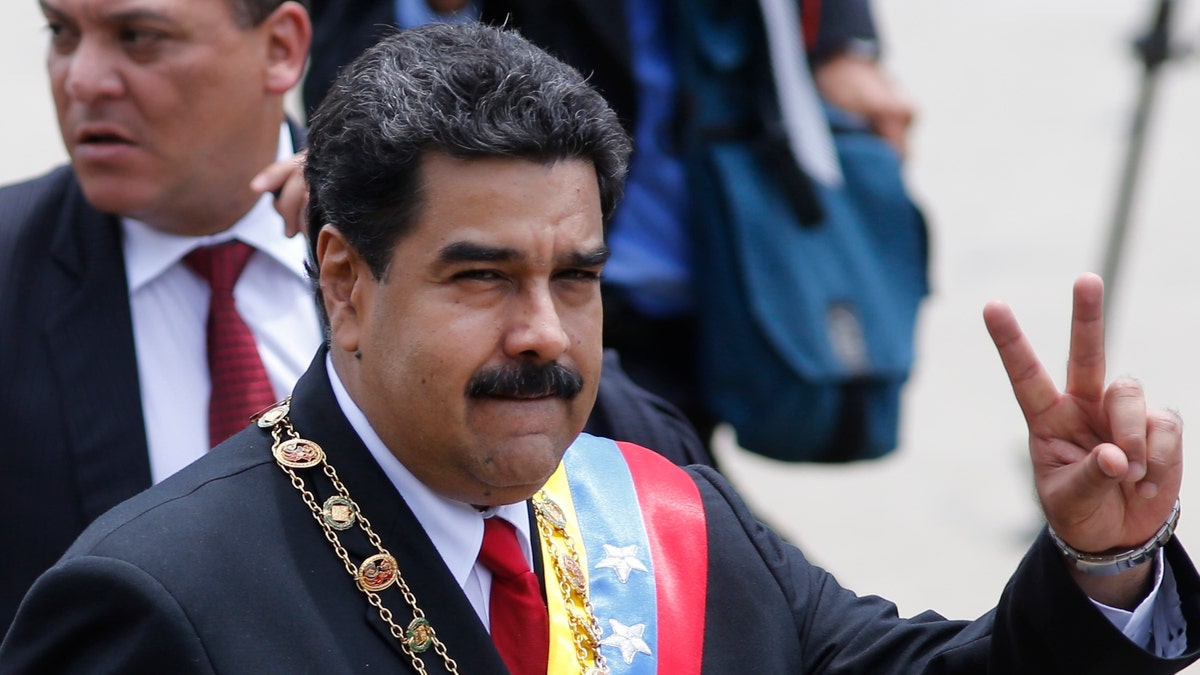
Venezuela's President Nicolas Maduro. (AP Foto/Ariana Cubillos)
CARACAS, Venezuela – As Venezuela sinks into an ever deeper financial and political crisis, the Chavez brand is increasingly devoid of the luster that brought all of Latin America at its feet in the past decade.
Many things happened since Commander Hugo Chavez rose to power in 1999, but analysts point to two key, lethal events over the last few years: Chavez died in March 2013 and, not long afterward, oil prices hit a historic low — and stayed there.
Then Nicolas Maduro happened.
Maduro was a bus driver before he became Chavez’s good friend, his vice president and lastly his handpicked successor to lead the socialist push in the region often called the “Bolivarian revolution.”
But with the government coffers dry and Maduro’s limited ability at the helm, the South and Central American countries once devoted to Chavez are ticking away from the troubled leader. Some in the right even use him as a scare tactic, pointing at today’s Venezuela as a cautionary tale.
“Maduro wants to be more Chavista than Chavez and he is paying the price,” political analyst Piero Trepiccione told Fox News Latino.
Trepiccione and many others in the opposition say it is Maduro’s radical ideology what makes him incapable of solving the acute economic crisis. They point out that in his three-plus years in office, Maduro has only tightened Chavez’s most controversial policies, such as more expropriations, more rigorous controls over the economy and endless bickering with the private sector.
As a result, inflation is now in the neighborhood of 700 percent — it was just over 20 percent in 2012, a year before Chavez succumbed to cancer amid a 59 percent approval rate.
Maduro’s approval rating is now at 23 percent.
“Maduro is incapable of understanding the economy and its problems. He is too radical,” said Luis Salamanca, a political scientist and college professor.
“Venezuela now has the second most controlled economy of Latin-American, just behind Cuba,” he added.
Salamanca and Trepiccione agree in that Maduro seems to lack Chavez’s ability to understand the fallout of a bad decision and fix things before they get out of hand.
According to an FNL count, since April 2014 Maduro has announced nearly 110 plans or “strategies” to fix the economy or to reduce crime, but none has shown results and problems have only worsened.
“Besides being more charismatic and popular, Chavez was way more pragmatic,” Salamanca told FNL.
Nicmer Evans, a political analyst who used to support Chavez, said that this characteristic made the late president’s government much more “democratic.”
“He always looked for legitimacy,” Evans told FNL. “Maduro, on the other hand, just tries to impose his ways.”
During his 14 years in office, however, Chavez was able to navigate easily thanks in large part to a favorable oil market, which critics say he used and abused in order to pump his popularity throughout the region. Chavez’s figure grew, they say, thanks to the cheap oil he provided to Caribbean and South American nations under generous conditions, and at a time of record-high energy prices.
Venezuela’s wealth at the time covered the government’s flaws, which came out in full display when oil prices dropped during Maduro's first year in office.
Even Cuba, Venezuela’s one time key ally and main trade partner, acknowledged recently that the crisis in the oil-rich nation is having a negative spillover effect on the island's economy.
“Maduro is afraid of being accused of betraying Chavez, so he just keeps acting like his most radical version and that makes him more intolerant to the opposition and dissent,” Trepiccione said.
His presidency has indeed repressed protests much more violently than Chavez’s did, hurting the country’s image abroad. Maduro’s regime doesn’t have the regional support than his predecessor’s did, and the Chavista aura of social justice has all but vanished.
A clear example of this is what’s happening at Mercosur, the South American trade bloc that has spent the last weeks maneuvering to prevent or delay Venezuela’s turn in taking over the group’s presidency.
“Venezuela’s government has taken its people to famine. They need a referendum,” said Argentina’s President Mauricio Macri to Spanish newspaper ABC, siding with the opposition's call for a vote to recall Maduro from office.
Macri openly used Maduro to get elected in Argentina last year, while in Spain the emerging political party "Podemos" was heavily linked to Chavismo by its enemies to stop its rise in the last two general elections.
It’s true that some of Venezuela current problems, like the oil prices drop, were not directly caused by Maduro. But he hasn’t handled these issues wisely, analysts say.
“Despite the crisis he doesn’t do anything differently. When he offers something new, it is just the same thing but with a new package,” Trepiccione said.








































